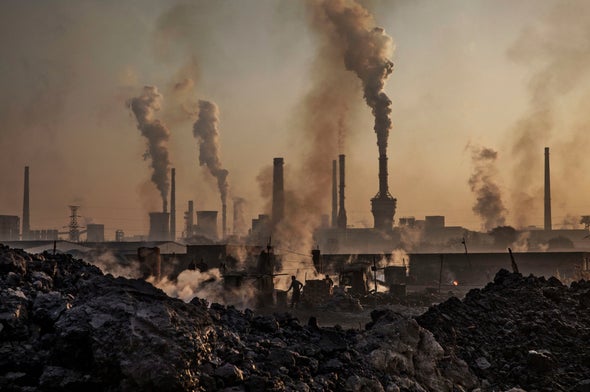In November 2021, two conferences that will be an important turning point for mankind were held. From October 31st to November 1st, the G20[1] Summit was held at the convention center La Nuvola in Rome, Italy. Right after, the 26th United Nations Climate Change Conference (COP26) was held in Glasgow, Scotland, from November 1st to 13th. ‘COP’ stands for Conference of the Parties and refers to countries that have joined the UN Framework Convention on Climate Change (UNFCCC)[2]. The conference, attended by a total of 197 countries over two weeks, was of great importance as it was an opportunity to materialize the treaties of the Paris Agreement signed in 2015. Let's find out the connection between the two international conferences held in succession, and what global issues were discussed in each.
Interesting Facts about 2021 G20 Rome Summit

On October 31st, protesters took to the streets in Rome, Italy, where the G20 summit was held. According to CNN on that day, the number of participants amounted to thousands and was varied, including those who lost their jobs due to globalization, environmentalists, and trade unionists. They marched calling for an equitable distribution of the COVID-19 vaccine and the effective response to climate change. Pointing out that the past summit meeting on the climate crisis of 30 years had failed, the protestors insisted that the time to achieve net-zero emissions should be set to 2025, not 2050. Workers fired from state-owned airlines also participated, saying that it is impossible to accept all G20 governments that dominate the world and exploit labor. The protest ended without any clashes or a governmental response. While the Italians were active enough to prove the international influence of the G20 meeting, Chinese Foreign Minister Wang Yi appeared in Rome instead of President Xi Jinping. President Xi Jinping, who was absent due to Chinese COVID-19 quarantine guidelines left after giving a video keynote speech. As a result, the first face-to-face meeting of U.S. President Joe Biden and President Xi Jinping was delayed once again. Russian President Vladimir Putin also delivered his speech through a video message, citing concerns about COVID-19. Meanwhile, the United States and Turkey, Britain and France held separate talks. The United States and Turkey have agreed to strengthen cooperation as NATO allies have differed on Turkey's import of Russian-made weapons. In addition, the Anglo-French conflict due to the dispute over fishing rights has not been alleviated even after the closed talks between the two countries at the G20 summit. On the same day, the BBC reported the result as “abysmal failure”.
What Were the Major Agendas of G20?
Introducing Global Digital Tax
One of the great achievements of the 2021 G20 Summit is that it reached an agreement on a digital tax aimed to be introduced in 2023. The digital tax is a tax levied separately from the corporate tax imposed by the country on the digital sales of online platform companies such as Google and Amazon. When a digital tax is introduced, companies have to pay taxes even in countries where services are provided, consumed, and where profits are made. The digital tax agreement consists of Pillar 1 for the applicable companies and the distribution of taxation rights, and Pillar 2 for introducing the global minimum corporate tax rate. Pillar 1 stipulates that taxation rights on the sales of large enterprises with annual sales of €20 billion and a profit margin of 10% or more are allocated to the government of the host country. So, companies that meet the criteria should pay 25% of their excess profits in each country in do business starting in 2023. As a result, the international community has been able to secure taxes on digital companies such as Facebook, which clearly have sales internationally but cannot be taxed because their headquarters are in the United States.

Also, according to the Associated Press on October 30th, the bill to set the global minimum corporate tax rate, which corresponds to Pillar 2, to 15% was unanimously passed. The bill was promoted to prevent tax evasion by mega-corporations, by establishing subsidiaries in regions with significantly low or no corporate tax. Multinational companies with sales of more than €750 million must pay a tax of at least 15% of their sales to continue business anywhere in the world. If the subsidiary is located in a country where the tax burden is less than 15%, the difference must be additionally paid in the country where the head office is located. At the Organization for Economic Co-operation and Development (OECD) meeting on October 8th, 136 out of 140 countries already approved this bill. Then, the OECD announced, “The landmark deal, agreed by 136 countries and jurisdictions representing more than 90% of global GDP, will also reallocate more than USD 125 billion of profits from around 100 of the world’s largest and most profitable multinational enterprises to countries worldwide”. With the final approval of the summits at G20, the global digital tax has a legal impact. It is significant in that the G20 countries account for 80% of the world's gross domestic product and exert great international influence. The U.S. Treasury Secretary Janet Yellen even referred to it as a “historic agreement.” Consultation on detailed standards between countries will continue. With the introduction of the global digital tax, IT companies will inevitably revise their management strategies. Attention is also focused on how the IT industry will respond to changes in the future.
Response to COVID-19 & Climate Change
In the first session of the 2021 G20 Rome Summit, 'Global Economy and Global Health', vaccine distribution disparity for COVID-19 was a key topic of discussion. Italian Prime Minister Mario Draghi mentioned in his opening speech that more than 70% of the population in developed countries have had at least one vaccination, whereas the vaccination rate in developing countries is only 3%. He further pointed out that “These differences are morally unacceptable and undermine the global recovery”. Accordingly, the G20 Rome Leaders’ Declaration contains specific goals and measures for responding to COVID-19. Each country has set a goal of helping 70% of the world's population to be vaccinated by the middle of 2022. The leaders also settled to share vaccine manufacturing technologies with newly established vaccine production hubs in South Africa and Brazil and agreed to support joint production.
Furthermore, the G20 member countries agreed on a clause to limit the increase in global average temperature to 1.5 degrees Celsius compared to the pre-industrial period. This is a step forward from the 2015 Paris Agreement on Climate Change, which agreed to limit the increase in global average temperature to between 1.5 and 2 degrees Celsius. Leaders have also pledged to provide $100 billion annually to developing countries to combat climate change by 2025 as well as to suspend financial support for the construction of overseas coal power plants. However, setting the goal of phasing out coal use failed although developed countries have proposed to achieve the goal of phasing out coal by the end of the 2030s. In addition, the world leaders disagreed on achieving carbon neutrality, a policy that makes actual carbon dioxide emissions ‘zero’ by 2050 and failed to set a conclusion. G20 was ended without specifying the time, with the comment “2050 if we want to be strict but given the diversity of the G20 countries … it means everyone agrees to a common goal while providing a bit of flexibility to take into account national diversity”. The main reasons were China, Russia, and Saudi Arabia, which did not participate in the face-to-face meeting, suggested the goal of 2060, while India objected to setting a date. As a result, some policies to tackle climate change have failed to reach an agreement or provide a new direction. Therefore, attention was focused on whether the COP26 on November 1st could produce meaningful results in response to climate change. After the G20 summit, the U.N. Secretary-General Antonio Guterres expressed hopes for COP26, mentioning “I leave Rome with my hopes unfulfilled, but at least they are not buried”.

The Results of COP26

COP26 was held in Glasgow, Scotland, with all the disappointments of the G20 and expectations for new solutions. The meeting was a place for 197 countries to discuss specific alternatives for the Paris Agreement of 2015. The first key here is each country's Nationally Determined Contributions (NDC). Every five years, each country must present detailed reduction plans and targets, and this COP26 was the first general meeting since the Paris Agreement. UK Prime Minister Boris Johnson emphasized the necessity to prepare countermeasures against climate change by saying “Children not yet born will not forgive today’s world leaders if they fail to confront the climate emergency” in the opening speech. On November 3rd, the World Street Journal (WSJ) reported that discussions on building the international Certified Emission Reduction (CER) market base at COP26 are progressing. The international CER market is a trading of carbon credits, which is a certain amount of greenhouse gas emission rights, according to the market. Although the EU and China operate their own CER exchanges, there is no single international integrated system, so standards and monitoring systems are all different. At this COP26 expectations were amplified as Brazil, which had been stubbornly opposed, stepped back. According to the declaration of COP26, which was extended by one more day due to difficulties in the final agreement, Article 6 of the Paris Agreement and the international carbon market guidelines were adopted. The possibility of revitalizing the international CER market increased as a unified international norm has been created.
The second key and serious global issue of COP26 is the cessation of coal use. At the beginning of the meeting, the UK focused on negotiating the withdrawal of coal under the slogan of ‘consign coal to history’. Coal usage is a serious global issue, but the G20 was criticized by international media for failing to reach an agreement on it. On November 13th, COP26 announced that it would accelerate efforts to phase out coal-fired power plants without carbon abatement devices and to phase out inefficient fossil fuel subsidies. The timing of the end of the subsidy was not mentioned. According to CNN, the discussion on coal ended with fixing the expression to phasing "down" of coal as India opposed to phasing "out."

With the two summits being held in succession, the world's attention is focused on a new trend that will emerge in the international society. They served as opportunities to check the progress of international cooperation along with each country’s position. There are different perspectives on the results of the G20 and COP26. Some evaluate that great progress has been made, while others criticize it for failing to come up with practical solutions. The agendas discussed at each meeting are not only in the realm of the leaders but are also issues about everyone’s daily life. Hence, it is necessary to pay constant attention to each of them.
[1] 20 countries including Russia, South Korea, the United States, and the European Nation
[2] Multilateral environmental agreement signed in 1992 calling for ongoing efforts for sustainability and protecting ecosystems

